Rosh Hashanah

Introduction
The Jewish New Year, Rosh Hashanah, is a solemn and happy festival that marks the start of a ten-day time of contemplation and spiritual rebirth. It is a time when Jewish communities around the world gather to reflect on the previous year and look forward to the possibilities of the next year. The sincere Rosh Hashanah greetings given among family and friends are fundamental to this event. We shall look at the significance of Rosh Hashanah greetings, their ancient and modern forms, and the deeper meaning behind these words of hope, introspection, and connection in this post.
Understanding Rosh Hashanah
Rosh Hashanah, which means “Head of the Year” in Hebrew, occurs on the first and second days of Tishrei, the Jewish month. This holiday is rich in tradition and symbolism, and it holds deep spiritual significance for Jews. Rosh Hashanah is a time to acknowledge God’s sovereignty, reflect on one’s acts and behavior, and beg forgiveness for any sins committed in the previous year.
During Rosh Hashanah rituals, the Shofar, a ram’s horn, is blown as a reminder of the call to repentance. It represents both God’s coronation as King and the awakening of the soul. Traditional dishes like honey-dipped apples indicate the desire for a sweet and abundant year ahead, while round challah bread depicts the cycle.
Rosh Hashanah Greetings: A Connection Tradition
Rosh Hashanah greetings are very important in this holiday. They are used to reconnect with loved ones, reinforce ties, and communicate best wishes for the new year. The sending of passionate Rosh Hashanah greetings is a Jewish community ritual that fosters warmth and harmony.
Greetings in the Traditional Style
The most common Rosh Hashanah greeting in Hebrew is “Shanah Tovah u’Metukah,” which translates to “A Good and Sweet Year.” This message captures the spirit of the celebration, wishing for a year filled with goodness and sweetness.
“L’Shanah Tovah Tikatevu,” another traditional greeting, means “May you be inscribed for a good year.” It refers to the idea that during the High Holy Days, God inscribes each individual’s fate in the Book of Life. As a result, this greeting expresses a wish for a good verdict in the future year.
Expressions of the Present
While traditional greetings remain popular, modern expressions of Rosh Hashanah greetings have also emerged, reflecting the changing times and the diverse nature of Jewish communities. These contemporary messages often blend Hebrew and the local language, creating a unique fusion of tradition and modernity.
In today’s interconnected world, Rosh Hashanah greetings are not limited to verbal expressions alone. Many people exchange digital greetings via email, social media, or messaging apps, accompanied by heartfelt wishes and images related to the holiday.
The More Meaningful Meaning of Rosh Hashanah Greetings
Rosh Hashanah greetings have a deeper significance that reflects the spiritual aspects of the celebration, beyond their surface professions of well wishes:


I just could not leave your website prior to suggesting that I actually enjoyed the standard information a person supply to your visitors?
Is going to be again incessantly to check out new posts